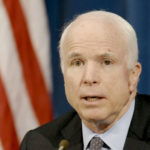McCain’s advice about communication has lessons for doctors, says Rachel Clarke
 The late Republican Senator, John McCain, who died on Saturday 25 August 2018 from a glioblastoma, enthralled American and British doctors alike as he dug in his heels last year to prevent the US president, Donald Trump, from repealing “Obamacare.” At stake was the health insurance of over 20 million Americans, who were threatened with losing their cover.
The late Republican Senator, John McCain, who died on Saturday 25 August 2018 from a glioblastoma, enthralled American and British doctors alike as he dug in his heels last year to prevent the US president, Donald Trump, from repealing “Obamacare.” At stake was the health insurance of over 20 million Americans, who were threatened with losing their cover.
The most dramatic showdown between the president and the maverick congressman came at 1am one night last July. The Senate hung in the balance. Trump would only achieve his long-held desire to repeal former US president, Barack Obama’s, flagship affordable healthcare law if McCain’s vote went his way. Looking frail and all of his 80 years, with his face still scarred from surgery related to his brain cancer, McCain strode with purpose across the Senate floor. He raised his right arm, paused for dramatic effect, then made a determined thumbs-down, drawing gasps from both sides of the aisle. In that moment, Trump’s healthcare bill was dead.
Ever controversial, defiant and strong-willed, McCain may well be remembered by doctors for this very public stand against an assault on Americans’ access to healthcare. But privately, in more reflective mode, he provides another—quiet, yet no less compelling—lesson for medics.
As a naval pilot shot down above Hanoi during the Vietnam War, McCain endured five and a half years as a prisoner of war in North Vietnam. He suffered beatings and torture so severe that, even at the end of his life, he was unable to lift his arms above his shoulders. McCain’s bravery was nothing short of heroic, as he even refused an offer to be sent home, insisting that first every other American serviceman captured before him should be released. But it is his first-person account of his harrowing ordeal, first published in U.S. News & World Report in 1973, that moves me most as a clinician.
In solitary confinement for over two years, trapped in a cell without even a window, McCain vividly depicts the life-saving power of being able to communicate with one’s fellows. “As far as this business of solitary confinement goes,” he wrote, “the most important thing for survival is communication with someone, even if it’s only a wave or a wink, a tap on the wall, or to have a guy put his thumb up. It makes all the difference.”
He described how the captured US servicemen developed a code through which they tapped messages to each other between the walls of their cells. Once, on hearing noises from the cell behind his, McCain spent weeks teaching the new inmate the code until, eventually, falteringly, he started to tap in response. “The story of Ernie Brace illustrates how vital communication was to us,” wrote McCain. “It took me several days to get him back up on the wall again. When I finally did, all he could say was, “I’m Ernie Brace,” and then he’d start sobbing. After about two days he was able to control his emotions, and within a week this guy was tapping and communicating and dropping notes, and from then on he did a truly outstanding job.”
Ernie Brace was a civilian pilot who was shot down over Laos, then spent three and a half years incarcerated in a bamboo cage in the jungle with his feet in stocks, and an iron collar around his neck. On several occasions, he was buried to his neck in the ground. After this prolonged and unrelenting cruelty, McCain’s staccato taps were his first friendly human contact.
Nothing in my life or my training as a doctor enables me to imagine such deprivation, yet how can I—or any of us—fail to be moved by Brace’s impassioned response to being recognised, after years of inhumanity, as human?
Perhaps, too often, we teach “communication skills” to students as though they are somehow deficient in this crucial part of medicine. Perhaps, if we really want to stress their importance, we should instead convey the power of communication—its ability, on rare occasions, literally to keep a person alive. If there is one thing John McCain and Ernie Brace should teach us, it is never to underestimate the potency of the sincere and genuine attempt—however awkward—to reach out and connect with a patient.
 Rachel Clarke is a specialty doctor in palliative medicine. Follow her on Twitter @doctor_oxford
Rachel Clarke is a specialty doctor in palliative medicine. Follow her on Twitter @doctor_oxford
Competing interests: None.
